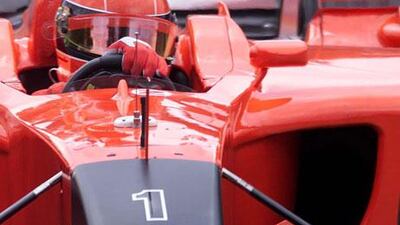Sunday should have been spent celebrating the 50th anniversary of America's proudest moment in Formula One.
Instead, September 11 will for ever be overshadowed by the distressing memories of two horrific and avoidable incidents: the attacks on New York's World Trade Center and the deadliest accident in F1 history.
Phil Hill remains the only American-born driver to win the world championship, powering his Ferrari to victory at the Italian manufacturers' home grand prix of 1961.
Everybody who can recall the race, however, remembers not Hill's triumph but rather the fatal accident of his teammate, Count Wolfgang Berghe von Trips.
The German aristocrat needed to finish third to become his country's first world champion, but when his car was launched into the crowd at Autodromo Nazionale di Monza while travelling at 240kph, he died instantly.
Eleven spectators were also killed.
Depending on reports, one to four other spectators died later.
It remains the sport's deadliest accident.
Michael Schumacher, who would claim Germany's first drivers' title 33 years later, honed his talents at a karting circuit at Kerpen created by Von Trips.
"Of course, I was always grateful for the opportunities that this experience gave me," Schumacher said.
"This is a very special thing, which I'm still proud."
Sebastian Vettel, the reigning world champion, also raced at Kerpen, and both drivers have undoubtedly benefited from the increased safety measures that have been implemented since 1961.
It often takes a breaching of safety or security to prompt an overhaul and the hijacking of two planes 10 years ago also resulted in widespread changes in airport customs.
Vettel, who became the youngest champion in the sport's history following his triumph at Yas Marina Circuit last season, was 14 when the attacks on the Twin Towers took place on Tuesday, September 11, 2001, killing nearly 3,000 people.
Saturday, the Red Bull Racing driver recalled his memories of the day.
"I remember I was going mountain biking and, just before I left, I saw on TV a plane had crashed into the World Trade Center," he said. "I thought, 'It's not true, something is wrong', so I left. When you are 14, you don't think about these things too much. Two hours later I came back and, obviously, I saw the pictures again. It's something we will never forget."
Vettel watched the 2001 Italian Grand Prix the following weekend, a race that almost took place without the inclusion of Ferrari, who contemplated withdrawing as a sign of solidarity with the United States.
Instead, the Italians raced with black nose cones. Schumacher was so badly affected, psychologically, that he recorded his worst finish of the season.
"I remember that we thought it was correct to race, and we did something on the nose," Stefano Domenicali, the Ferrari team principal, said earlier this week. "It was the first time in our history that we did something so special. We felt it was really important to show to all the Americans that we were close to them in that moment."
Domenicali confirmed that nothing special will be added to the two cars today, but added: "it is still part of our big memories."
McLaren-Mercedes pair Lewis Hamilton and Jenson Button are also unlikely to adapt their cars for the occasion, with the latter saying "it is important to remember, but also time to move on".
Alex Zanardi agrees. The former Formula One driver lost both his legs in a Champ Car World Series accident the weekend immediately after 9/11, but time, as ever, proved itself a great healer. Within two years, Zanardi was driving with prosthetic legs. The Italian now has decided to compete for a place in his country's 2012 Paralympic handbiking team.
"Out of all the things I could do with what I had left, I discovered this activity," he said in a recent interview.
"When, in 2009, I didn't find a fantastic programme in motor racing, I decided to stop and dedicate more time to this activity. Basically, to realise a dream: London 2012."

